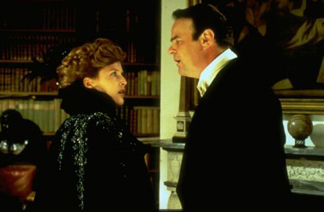Mischievous Mirth
Sex in the City, Wharton-style
By Eloise Campbell

Dana Scully and Raymond Stantz find themselves supernaturally
transported into a period film.
Had Lily Bart, Edith Wharton's unlucky heroine in director Terence Davies' adaption of her book, lived in today's New York, she would most likely have a fabulous apartment on the Upper West Side (that she couldn't quite afford), see a shrink a couple of times a week (augmented by occasional Xanax), and go through boyfriends faster than the crew on Sex and the City. She would be one of the many women in the modern world who feels that they don't quite belong, but have enough coping skills to get on with life. In other words, she would make do.
Yet, trapped in turn of the century (20th century, that is) New York, a time when there existed hardly any middle class and the aristocracy was allowed to be as self-gratifying as it wished, Lily is reduced to a sad creature forced to adhere to a rigid code that she had no hand in creating.
Played by an austere and prim Gillian Anderson, Lily is at times frustrating in her lack of expression and suppression of emotions. Fans of the X-Files may find her role quite comforting as it is reminiscent of the stilted and controlled Scully - only in turn of the century costumes. Her acting ability for this role, however, hits the mark as Anderson's Lily is simply not allowed to be anything but polite, even in the most trying of circumstances. Anderson knows this character well and is a pro at portraying the vexed character of Lily Bart.
Lily, raised to believe that she belongs in the lap of luxury, is in a perilous predicament for her time and culture. At the dangerous age of 29, Lily's twilight of opportunity to find a husband - a well-placed and wealthy husband - is closing. And though the pool of eligible men is dwindling, she still has a few opportunities. Yet she repeatedly lets each slip by, probably because she doesn't really care for what has been offered her.
While this kind of tale may sound a little too Dynasty-esqe for modern moviegoers to swallow, Lily, is, indeed, the heroine of the story (most of the other characters are hideously vile) because she is not nearly as calculating or manipulative as her lot in life demands she be. In fact, her precarious position as a neophyte looking for acceptance and approval from the über-rich circle sends Lily on a path of self destruction, twisting her in one horrible direction after another.
Battling all accepted Hollywood clichés, what Lily doesn't know DOES hurt her. And even though the audience may be silently screaming, "Do something. Do anything," Lily is paralyzed by her culture and era - a time when women had no independence.
Sim Rosedale (played by a chubby Anthony LaPaglia), a wealthy Jewish robber baron, courts her throughout the film but is deemed unsuitable because of his ethnicity (although this is not played up in the movie). More importantly, at least to Lily, Sim is not part of the elite "in-crowd," despite his massive wealth.
Lawrence Seldon (played by a charming and smooth talking Eric Stolz), on the other hand, is not wealthy enough for Lily - he works as an attorney - yet is adored by the super rich set of which Lily so much wants to be a member. The love story, or potential for one, takes place between Lily and Lawrence and their exchanges are sharp, full of restrained sexual tension. Anderson and Stolz practically have SEX while sharing a cigarette, all while remaining respectively dressed. The feisty and somewhat coquettish Lily shines brightest in Lawrence's presence, revealing her true self, restless and spirited. Lawrence, of all of the characters, has the most confidence in her, though he, too, fails Lily at her time of greatest need.
While wading through her marital possibilities (subconsciously not really wanting to get married in the first place but desperately seeking the security it would afford her), Lily faces several subplots and evil twists, each of which winds up crippling her financially and socially. Bertha Dorset (played by a saccharine Laura Linney) is supposed to be one of Lily's dearest friends, yet she embroils her in a devious plot that costs Lily her reputation, the most important asset a women of that era can possess.
Another insidious character, Gus Trenor (played by a brash Dan Aykroyd), tricks Lily into "investing" her money with him, to disastrous effect.
Her reputation destroyed and her money gone, Lily solemnly accepts her misfortunes and enters the working class. The second half of the film is murky, grim, and somber as the audience must watch Lily slowly self destruct - a striking comparison to the first half of the film, full of twirling parasols, airy fétes, and double-entendred lines that only Edith Wharton could purvey.
Thus, the tragic tale the author penned so many years ago remains a valid scathing social commentary of the aristocracy and their obscene ways.
The House of Mirth opens this Friday at the Kentucky Theatre. See the movie clock on page 15 for times.
HOME | THIS ISSUE | ACE ARCHIVES